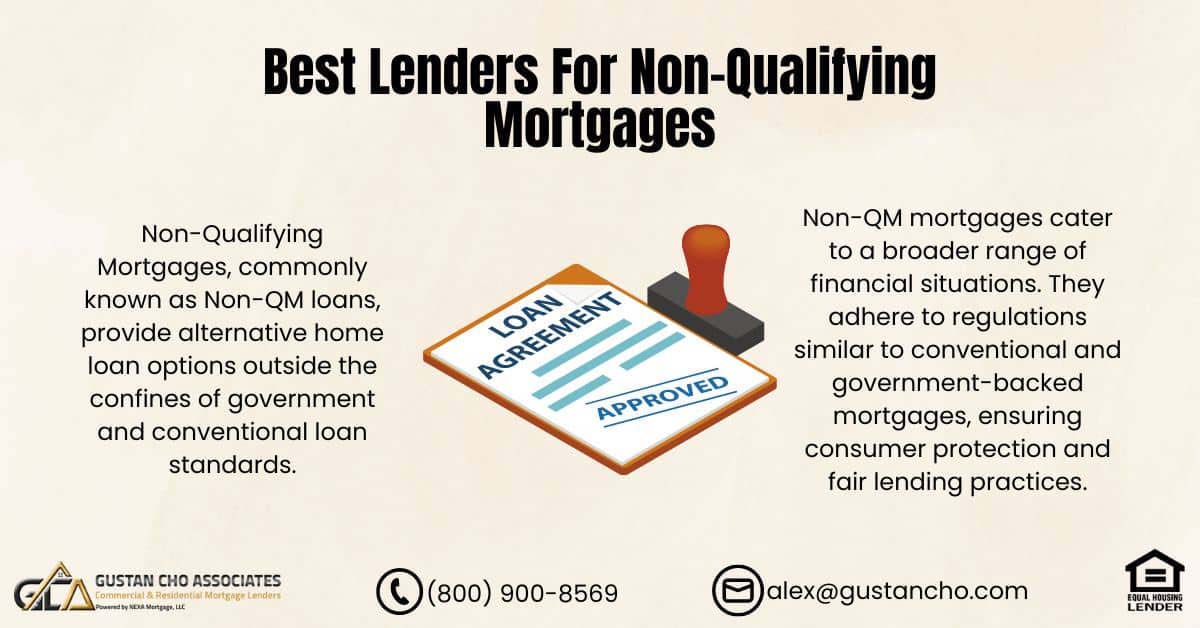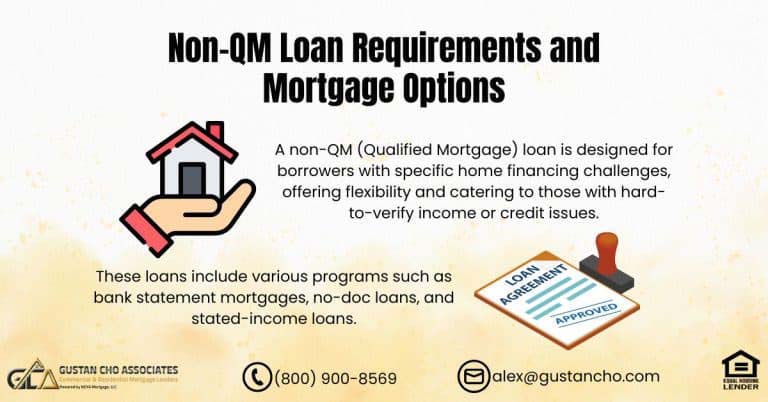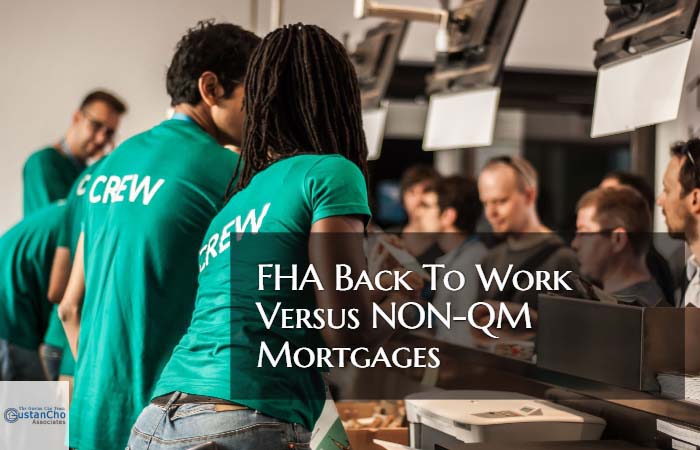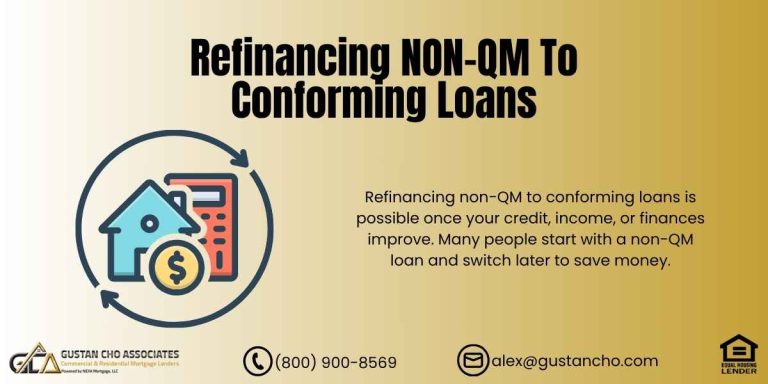Non-qualifying mortgages, commonly known as Non-QM loans, cater to borrowers seeking alternative home loan programs that diverge from the parameters set by government and conventional loan standards. Unlike conventional loans, non-qualifying mortgages accommodate individuals who may not fit the traditional criteria due to various factors.
Contrary to common assumptions, Non-QM loans aren’t exclusively designed for borrowers grappling with credit or income challenges; even those boasting excellent credit scores may opt for such mortgages to access alternative financing avenues. These loans offer flexibility and cater to diverse borrowers, acknowledging that one size does not fit all in-home financing.
Click Here If You Need A Non-QM Loan
Non-QM Loan Options For Bad Credit
Non-qualifying mortgages (Non-QM) and alternative financing avenues offer numerous advantages for borrowers who don’t meet conventional mortgage criteria. These individuals may encounter barriers related to factors such as loan size, self-employment status, property type, or credit history.
Tailored to accommodate owner-occupied homes, second residences, and investment properties, Non-QM, and alternative mortgage options address the diverse needs of borrowers beyond traditional guidelines.
It’s important to note the distinction between non-QM loans and subprime or hard money loans, as they are often mistakenly grouped. Unlike subprime or hard money loans, Non-QM mortgages cater to a broader range of borrowers and financial situations, providing flexible solutions beyond the confines of conventional lending standards.
Mortgage Rates On Non-Qualifying Mortgages
Non-qualifying mortgages (Non-QM) are an appealing option for borrowers with strong credit scores, offering competitive rates that rival traditional mortgages. It is worth noting that the interest rates offered by non-QM wholesale lenders can vary depending on the level of risk they are willing to take on.
Like any other lending organization, the interest rates will be higher if a borrower is considered risky. Therefore, while non-QM mortgage rates may initially seem advantageous for A credit borrowers, they can be subject to adjustments based on the lender’s risk assessment.
Despite the potential for fluctuating rates, Non-Qualifying Mortgages bring several benefits, making them a viable choice for certain borrowers. These benefits often include greater flexibility in income documentation requirements and eligibility criteria, catering to individuals who may not fit the mold of traditional mortgage applicants.
Exploring Non-Qualifying Mortgages can help borrowers understand their financing options and make informed decisions about their home loans.
What Are Non-Qualifying Mortgages Versus Qualified Mortgage Loans
Non-qualifying mortgages (Non-QM) cater to homebuyers seeking mortgage options beyond the boundaries of conventional or government-regulated guidelines. It’s crucial to clarify that non-QM mortgages diverge from subprime or hard money loans, a common misconception among homebuyers and real estate professionals.
Contrary to these misconceptions, non-QM loans adhere to strict regulations, similar to conventional and government-backed mortgages.
Non-QM loans for owner-occupied properties are subject to comprehensive regulation, ensuring consumer protection and financial stability. Features typically associated with subprime or hard-money lending, such as pre-payment penalties and high interest rates, are prohibited on Non-QM loans.
Lenders must adhere to federal mortgage guidelines and regulations, mirroring the standards applied to conventional and government-backed mortgages. This regulatory framework remains particularly stringent for owner-occupied mortgages, safeguarding borrowers against predatory lending practices and ensuring fair access to mortgage financing options.
Mortgage Regulations On Qualified Versus Non-Qualifying Loans
In the preceding paragraph, we delved into the concept of Non-Qualifying Mortgages. However, explaining the concept of qualified mortgages is important to understand this topic fully. After the 2008 financial crisis, significant changes were made to the home mortgage industry, creating new rules and regulations.
Establishing the Consumer Financial Protection Bureau (CFPB) marked a pivotal moment among these changes. Concomitantly, traditional documentation such as the Good Faith Estimate and the HUD-1 Settlement Statement underwent discontinuation, making way for introducing the Loan Estimate (LE) and Closing Disclosure (CD).
In 2014, the CFPB implemented the Qualified Mortgage (QM) rule and regulation, primarily emphasizing consumer protection.
This entailed stringent measures against predatory lending practices and deceptive advertising, backed by formidable penalties for offenders. Notably, implementing the ability-to-repay rule mandated lenders to prudently assess borrowers’ financial capacity to avert potential defaults on mortgage repayments.
Through this regulatory framework, lenders were mandated to exercise due diligence in extending mortgages only to borrowers with the financial means to fulfill repayment obligations, thereby mitigating the risk of default.
Qualified Mortgages: The Ability To Repay
The recent updates in mortgage regulations emphasize implementing the ability to repay rule, ensuring that borrowers can meet their mortgage obligations without facing undue financial strain. Prohibited under these regulations are teaser rate loans, characterized by initially low payments that escalate to potentially unaffordable levels for borrowers.
Lenders are now restricted from charging more than 3% of the loan amount for residential home mortgages. Additionally, lenders must thoroughly document borrowers’ income, employment status, and the sustainability of their income for the next three years to ensure compliance with these regulations.
One significant aspect of the revised regulations is the emphasis on preventing Non-Qualifying Mortgages, particularly those with unsustainable payment structures that could lead to financial distress for borrowers. The regulations aim to promote responsible lending practices and protect borrowers from potential financial pitfalls by outlawing teaser rate loans and imposing limitations on lender fees.
To ensure borrowers’ safety, it’s necessary to have complete documentation of their income and employment stability. This way, they will clearly understand their financial obligations and be able to meet them in the long term when entering into mortgage agreements.
Overall, these regulatory changes seek to foster a more stable and sustainable mortgage market while safeguarding the interests of borrowers.
Processing And Mortgage Underwriting Of Non-QM Loans
Lenders need to analyze and make sure the borrower has the following criteria before approving a mortgage:
- Stable income
- Assets
- Stability with their current employment and the likelihood for employment to continue for the next three years
- The ability for the borrower to pay their monthly mortgage payments and other debts
- Past credit history and timely payments in the past 12 months
- Charges and fees on loans with a balance greater than $100,000 cannot exceed 3% of the loan amount
- Debt to income ratio cannot exceed a ratio greater than the amount they can afford
- Every loan program has its maximum debt to income ratio caps
The Qualified Mortgage rules and regulations were passed to protect the consumer against high costs and predatory lending. To Qualify For A Mortgage, Click Here
Non-Qualifying Mortgage Lenders
Introduced in 2013, Non-Qualifying Mortgages emerged in response to the cessation of non-conforming mortgages following the 2008 financial crisis. Non-qualifying mortgages refer to programs that deviate from Qualified Mortgage (QM) guidelines. These loans are designed to serve borrowers who need to meet traditional QM standards.
Specifically, non-QM loans target individuals who may be creditworthy but fail to meet the conventional QM criteria. Lenders specializing in Non-Qualifying Mortgages establish their lending criteria while adhering to regulations concerning borrowers’ ability to repay. Generally, higher-risk loans attract higher interest rates that depend on the borrower’s credit score and down payment.
Mortgage Rate Pricing On Non-Qualified Loans
Therefore, non-QM mortgage rates are generally higher than traditional government and/or conventional loans:
- The higher the risk for the lender, the higher the mortgage rates
- However, borrowers with higher credit scores and lower loan to value can get competitive rates on non-QM loans
- This holds especially true on non-QM Jumbo loans
- Non-QM loans are becoming increasingly more and more popular
Non-QM mortgages are benefiting borrowers during today’s booming housing market.
Borrowers Who Can Benefit From Non-QM Loans
Non-QM mortgages enable borrowers who could not qualify for a home loan who could not qualify for a mortgage. For example, there are non-QM loan programs such as bank statement mortgages for self-employed borrowers that do not require income tax returns. Investor non-QM loan programs include fix and flip loans where the subject property is underwritten.
Many investor non-QM loan programs do not require income documents. Non-QM mortgages are not just for borrowers with bad credit. Many borrowers with high credit scores and great income can benefit from non-QM loans. In general, non-QM lenders can make exceptions on a case-by-case basis in getting a borrower approved.
Gustan Cho Associates has dozens of lending partnerships with non-QM wholesale lenders. If there is a non-QM loan program that is available in today’s marketplace, Gustan Cho Associates has it.
If you have any questions Best Lenders For Non-Qualifying Mortgages, please contact us at Gustan Cho Associates at 800-900-8569. Text us for a faster response. Or email us at gcho@gustancho.com. The team at Gustan Cho Associates is available 7 days a week, on evenings, weekends, and holidays.
FAQs About The Best Lenders For Non-Qualifying Mortgages
- What are Non-Qualifying Mortgages (Non-QM loans)? Non-Qualifying Mortgages, commonly known as Non-QM loans, provide alternative home loan options outside the confines of government and conventional loan standards. Unlike conventional mortgages, Non-QM loans cater to borrowers who may not meet traditional criteria due to various factors, offering flexibility in eligibility.
- Who can benefit from Non-QM loans? Non-QM loans aren’t solely for individuals facing credit or income challenges. Even borrowers with excellent credit scores may choose Non-QM mortgages to explore alternative financing avenues. These loans accommodate diverse borrower needs, acknowledging that standard mortgage programs may not suit everyone.
- How do Non-QM loans differ from subprime or hard money loans? Non-QM loans should not be confused with subprime or hard money loans. While subprime loans typically target borrowers with poor credit, Non-QM mortgages cater to a broader range of financial situations. They adhere to regulations similar to conventional and government-backed mortgages, ensuring consumer protection and fair lending practices.
- What factors affect mortgage rates on Non-Qualifying Mortgages? Mortgage rates on Non-QM loans can vary based on the lender’s assessment of risk. Borrowers with stronger credit scores and higher down payments may secure more competitive rates. However, rates on Non-QM loans generally tend to be higher than those on traditional mortgages, reflecting the increased risk for lenders.
- Who qualifies for Non-Qualifying Mortgages? Non-QM loans cater to various borrower profiles, including self-employed individuals, investors, and those with unique financial circumstances. Borrowers who may not meet conventional loan criteria can explore Non-QM options for homeownership or investment opportunities. Lenders may consider each applicant on a case-by-case basis, allowing for exceptions based on individual financial situations.
- How can I access Non-Qualifying Mortgages? For access to Non-QM loan programs, borrowers can connect with mortgage brokers or lenders specializing in alternative financing. It’s essential to work with professionals who understand the intricacies of Non-QM lending and can guide borrowers through the application process to find the most suitable mortgage option.
Qualify For A Mortgage With A Lender With No Overlay By Clicking Here
This blog about the Best Lenders For Non-Qualifying Mortgages was updated on February 8, 2024.









